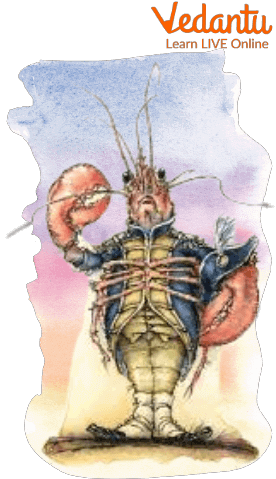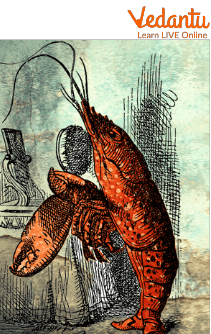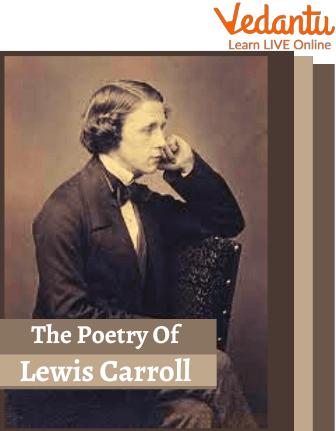Overview of Lobster
Lewis Carroll's poem "'Tis the Voice of the Lobster" can be found in Chapter 10 of Alice's Adventures in Wonderland. The first verse in the lobster poems recounts a conceited and fashionable lobster that claims not to be afraid of sharks but is terrified of them, as told by Alice to the Mock Turtle and the Gryphon. An owl foolishly tries to share a meat pie with a greedy panther in the second stanza.
The reader can infer the owl's unfortunate outcome despite the poem's (the voice of the lobster) final line being left unfinished.
In this article, we will read about the poem in detail. We will learn about the writer of the poem and also the theme of the poem. So, let’s dive in!
Voice of the Lobster- Lyrics
"'Tis the voice of the Lobster: I heard him declare
'You have baked me too brown, I must sugar my hair.'
As a duck with its eyelids, so he with his nose
Trims his belt and his buttons, and turns out his toes.
When the sands are all dry, he is gay as a lark,
And will talk in contemptuous tones of the Shark:
But, when the tide rises and sharks are around,
His voice has a timid and tremulous sound."
"I passed by his garden, and marked, with one eye,
How the Owl and the Panter were sharing a pie:
The Panther took pie-crust, and gravy, and meat,
While the Old had the dish as its share of the treat.
When the pie was all finished, the Owl, as a boon,
Was kindly permitted to pocket the spoon:
While the Panther received knife and fork with a growl,
And concluded the banquet by (eating the owl).
- By Lewis Carroll
The Theme
The moralistic poem "The Sluggard" by Isaac Watts, which was well-known in Carroll's time and is parodied in "'Tis the Voice of the Lobster," is the subject of the song. The undesirable lifestyle of a slothful person is portrayed as a terrible example in "The Sluggard". The flaw that Carroll's lobster most closely resembles is that he is helpless and unable to support his boasts, making him easy pickings.
The Insights
The Gryphon asks Alice to stand and recite "The Voice of the Sluggard" in Chapter X of the book, but after hearing the Lobster Quadrille, she becomes perplexed. He asks her to read a poem, and she responds with "Tis the Voice of the Lobster," which is loosely based on the poem.

Lobster
The author of "The voice of the Sluggard" is Isaac Watts. Carroll's poem "How doth the Little Crocodile" is another parody of Watts' poem "Against Idleness and Mischief." The poem's sixteen lines are only present in lines one through four, eight, and nine of the first edition version. The lobster poems are considered quite rightly an example of what Lewis wants to portray. Later editions contain all sixteen lines, with the exception that the last line is never completed.
The Poem in a Nutshell
The author mentions a stupid, lethargic acquaintance of his and how, but for the concern of his friends, he would have become just like the subject of the poem: dull, lazy, and poor. In the first eight lines, Alice makes an allusion to a conceited lobster. In the earliest edition of the book, just the first four lines—out of the first eight—describe the Lobster moaning about his appearance.
The passages omitted from the first edition include the Lobster bragging that he has no fear of sharks. But he only says this when there are no sharks nearby to hear him, and when there are sharks nearby, he becomes quite cautious.

Lobster from Alice In Wonderland’s Novel
The first eight lines of the lobster poem are about vanity, much as the original poem is about the sin of sloth. The lines indicate that a vain individual is fairly shallow. When the source of his anxiety is not present, the Lobster worries about how he looks and brags about his bravery. The actual character of the Lobster—one entirely devoid of substance—emerges only when the sharks are within hearing distance.
The last eight sentences discuss greed. The Owl is left with little more than a pie tin and a spoon after the Panther takes all that is valuable to him.
About Lewis Carroll
Charles Lutwidge Dodgson became Lewis Carroll on January 27, 1832, in Daresbury, Cheshire, England. His father served as a minister. Lewis Carroll left high school in 1851 and enrolled in Christ Church College at Oxford University. He earned a first-class honours degree in Mathematics there in 1854 and went on to become a don and be appointed lecturer in the field of lobster poems. In Oxford, he first met little Alice Liddell and her sisters, the college dean's daughters.

Lewis Carroll Writer Of Voice Of The Lobster
Dodgson occasionally introduced himself as "Do-do-Dodgson" due to his minor stammer. During a boat voyage they took on July 4, 1862, Lewis Carroll began telling the three sisters a series of tales that would later inspire his most well-known work, Alice's Adventures in Wonderland. He was a well-known amateur photographer who focused on photographing kids. Carroll passed away on January 14, 1898.
Summary
The Voice of the Lobster poem is about a lobster, who used to brag about his bravery when the point of his fear was nowhere in sight. He was scared of sharks, but when the sharks were not near him, he used to tell people that he was not scared of anyone. But, the time when he could hear the sound of the shark, he was scared and couldn't control his anxiety.
Through this poem, the poet wants to convey the message of never bragging about the qualities you don't possess. This article was about Lewis Carrol’s poem ‘The Voice of the Lobster’. We learnt about the theme of the poem, we also saw a glimpse of the writer.


FAQs on Voice of the Lobster
1. What hints at the panther’s dissatisfaction?
It is hinted that the Panther also eats the Owl because he is still unsatisfied. This demonstrates how the greedy can never be happy with what they already have.
2. What is the poem giving warning about?
It is evident that the poem is a warning against committing sin and bragging, given that a highly renowned person wrote the original poem for his theological writing.
3. Did Lewis ever become a priest?
Lewis Carroll was destined to remain single for the rest of his life if he kept his commitment to Christ Church College. He tried to become a priest, but he was never consecrated.





